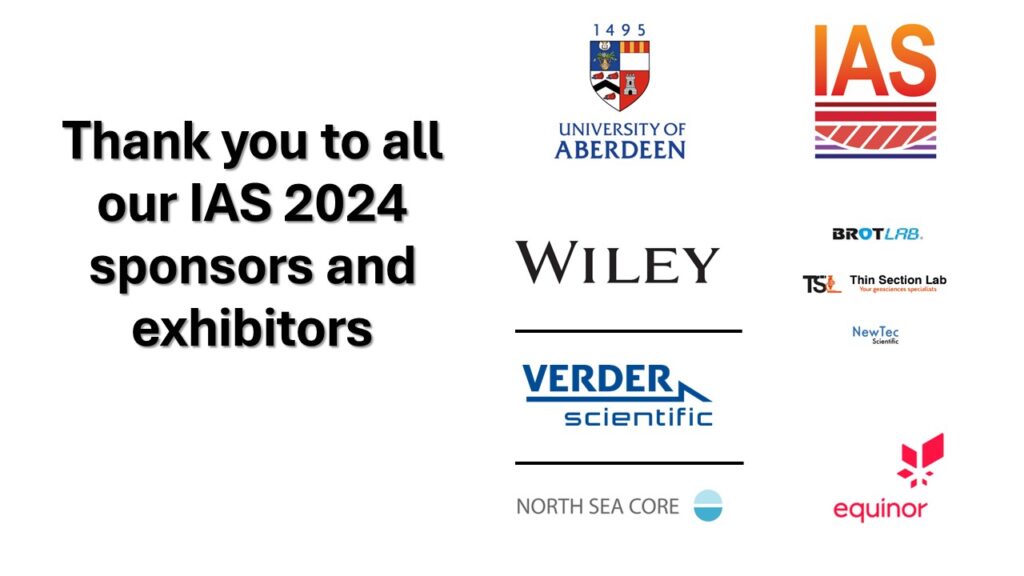IAS 2024: Aberdeen
25 – 27 June 2024
The IAS Conference 2024 took place in Aberdeen from 25 – 27 June 2024. You can now download the Oral and Poster Abstract Booklets complete with Author Index so you can easily find the abstract you are interested in.
The conference theme is Adapting to a Changing World and sub-themes will be derived from the abstract submissions received.

The four keynote speakers are:
Professor Anneleen Foubert
Professor Foubert is Head of Research Group at the Universite de Fribourg in Switzerland.
Geo-biosphere interactions are one of the most fascinating processes active within the system ‘Earth’. Especially the carbonate sedimentary record witnesses the complex interplay between the Geosphere and the Biosphere. Studying frontier carbonate systems is therefore my main research axis with a major emphasis on the comprehension of the evolution of carbonate mound systems through space and time.
The thorough understanding of microbial-induced early diagenesis and the impact of diagenesis on the dynamic petrophysical behavior (porosity and permeability) in carbonate systems (through space and time) is hereby an additional crucial aspect.
Through the active organization of fieldwork on land (e.g. Italy, Spain, Turkey, Morocco, US, Spitzbergen,…) or at sea (from the Norwegian margins to the North-African margins) and through international drilling campaigns (IODP – ICDP), one could decipher step by step the secrets of the carbonate world.
Professor Emese M. Bordy
Emese Bordy is a Professor of Geology at the University of Cape Town in South Africa. She received her PhD from Rhodes University, after an MSc from Eötvös University, Hungary. She was a postdoctoral researcher in the Evolutionary Science Institute in Johannesburg, following which she lectured geology at Rhodes University until 2011.
Her research in clastic sedimentology focuses on quantifying biogeographic and palaeoecological processes as archived primarily in the Palaeozoic and Mesozoic depositional record of southern Africa. She appreciates the opportunities her expertise in sedimentary geology, stratigraphy and continental ichnology affords for collaborations with experts from various Earth Science fields. She enjoys her editorial work at academic journals and is passionate about mentoring the next generation of Earth scientists, having supervised >50 postgraduate students, including PhDs and postdocs.
Professor Sanjeev Gupta
Professor Gupta is an Earth and Planetary Scientist with broad research interests in understanding modern and ancient environmental change on Earth’s surface and on Mars.
He is a a Co-Investigator on:
- the Mastcam camera team on the Mars Science Laboratory Curiosity rover mission in Gale crater, Mars
- the Pancam camera team on the ExoMars 2020 rover mission to Mars
- the Mastcam-Z camera team on the NASA Mars 2020 rover mission
He has used high-resolution sonar data gathered from the English Channel to explore the submerged landscapes beneath the sea. This led to the discovery that catastrophic megafloods separated Britain from Europe, and explained how Britain became an island.
Professor John Underhill
John Underhill is Aberdeen University’s Interdisciplinary Director for Energy Transition and Professor in Geoscience and Energy Transition in their School of Geosciences. He is the academic executive director of the UK’s GeoNetZero* Centre of Doctoral Training (CDT). His research interests focus upon the role of geoscience in the energy transition and use of methods and data in providing the best solutions and outcomes to deliver low-carbon net zero goals. Before taking up an academic career that has seen him hold posts at Edinburgh, Heriot-Watt and Aberdeen Universities, John worked as an Exploration Geoscientist for Shell and has also undertaken sabbaticals with bp in Glasgow and Norsk Hydro in Bergen. John helped lead Heriot-Watt’s efforts to set up the Lyell Centre for Earth and Marine Science and Technology and was the University’s Chief Scientist. He was a board member of the European Association of Geoscientists and Engineers (EAGE) for three years and their President in 2011-12. John was the Chair of the National Energy Skills Accelerator (NESA), a collaboration between Aberdeen University, Robert Gordon University *RGU), North-East Scotland College, Skills development Scotland and Energy Transition Zone (ETZ) in 2022-23. An unusual fact is that he also was a professional football referee who officiated in the top-flight matches in Scotland and Europe between 1994-2008.
*GeoNetZero = The Role of Geoscience in the Energy Transition and in addressing the Challenge to meet net zero emission targets
